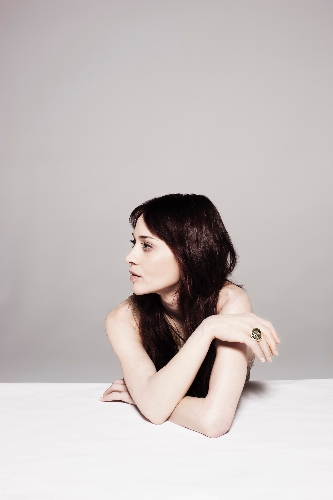Fiona Apple, performing at The Joint, lays bare her emotions
Some of the most arresting moments arrive when her pretty voice turns ugly.
"Look at, look at, look at, look at me!" Fiona Apple commands in a series of exclamatory bursts, verbal lightning bolts, her words suggestive of a cat with its back arched, ready to strike.
She sounds pained, desperate, as if all the oxygen had suddenly been sucked out of the vocal booth.
It doesn't register as an affectation or forced melodrama at all: It feels real, almost uncomfortably so, a measure of vulnerability palpable enough to stir those same feelings in the listener and, as a result, the reflexive instinct to recoil from it instantly.
And then, just a few bars later, Apple sounds as if she's singing through a smile, all girlish charm and knowing precociousness.
"I will try to hold onto to you with open arms," she coos, practically winking at the inevitable futility of her aim.
These two moments, separated by 30 seconds or so, say a lot about Apple, her new record, her career.
A persistent, unwavering lack of emotional inhibition, no matter how it makes her look or how it makes you feel, is the nucleus of Apple's raw hearted songbook.
Take the tune in question, "Daredevil," a sinewy piano vamp with flitting percussion from Apple's latest disc, "The Idler Wheel is Wiser than the Driver of the Screw and Whipping Cords Will Serve You More than Ropes Will Ever Do." (Yes, her album titles remain as unabridged as her emotions.)
On the song, Apple explains how she's learned how to harness life's turbulence into something more galvanizing by way of equating herself to an airplane.
"The gashes I get from my heartbreak makes the slots and the flaps upon my wing / And I use 'em to give me lift," she sings, her voice rising along with the imaginary jet.
As her words indicate, Apple's come a long way.
Flash back to 1997, when, at the age of 19, she's being interviewed by Howard Stern, labeling herself "a pissed off female artist," while swatting away horn dog come-ons like a tennis pro returning serve. Or recall her hot-blooded, expletive-spiked acceptance speech at the MTV Video Music Awards that same year.
Back then, Apple struggled to keep a grip on her emotions, almost to self-parodying degree.
And then somewhere between her second album and her third she seemed to stop trying to do so altogether.
That's when she went from hit maker to something less predictable and more challenging, in all the right ways.
"Idler Wheel," her fourth album overall and first in seven years, exemplifies as much.
Sonically, it's a spare sounding record, albeit a busy one, with an abundance of drum loops and percussion that often sounds like something else - malfunctioning machinery, someone scraping something off the bottom of their shoes, doors slamming shut.
Apple's singing voice is akin to a liquid that changes shape depending on the vessel it's poured into.
She sounds as if she's choking back tears by the end of album opener "Every Single Night," a song that begins as a lullaby before turning ever inward, shouts herself hoarse on "Regret" and peppers "Periphery" with pinpricks of falsetto.
It all makes the album feel lopsided and asymmetrical, heavy with emotion one moment, light with humor the next, highly manic, but in an invigorating way.
At its core, this is a record of love songs and laments - it's hard to have the former without eventually getting to the latter, as Apple exhibits.
As such, there are some sore feelings.
"You taught me to be mean," she accuses a former flame on "Regret," the album's most vengeful tune.
But mostly, Apple seems at peace with her lack of peace on "Idler Wheel."
"Every single night's alright, every single night's a fight / And every single fight's alright with my brain," she sings on "Every Single Night."
Still, this isn't a tidy record with a clear sense of resolution when it's over.
"Idler Wheel" is as chaotic and haphazard as the emotions that catalyzed it.
Nothing here comes easy; the sun doesn't always shine.
But, as Apple herself is wont to say, there's nothing wrong with a song that ends in a minor key.
Contact reporter Jason Bracelin at jbracelin@ reviewjournal.com or 702-383-0476.
Preview
Fiona Apple
8 p.m. Saturday
The Joint at the Hard Rock Hotel, 4455 Paradise Road
$29.50-$95 (693-5583)























